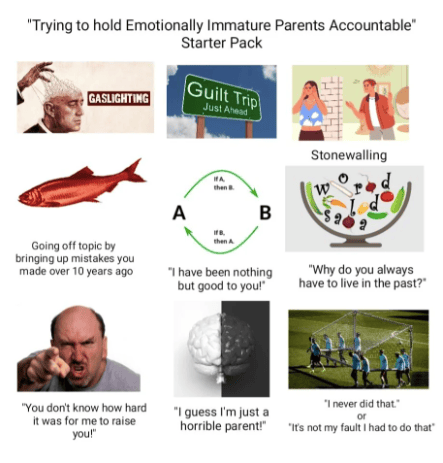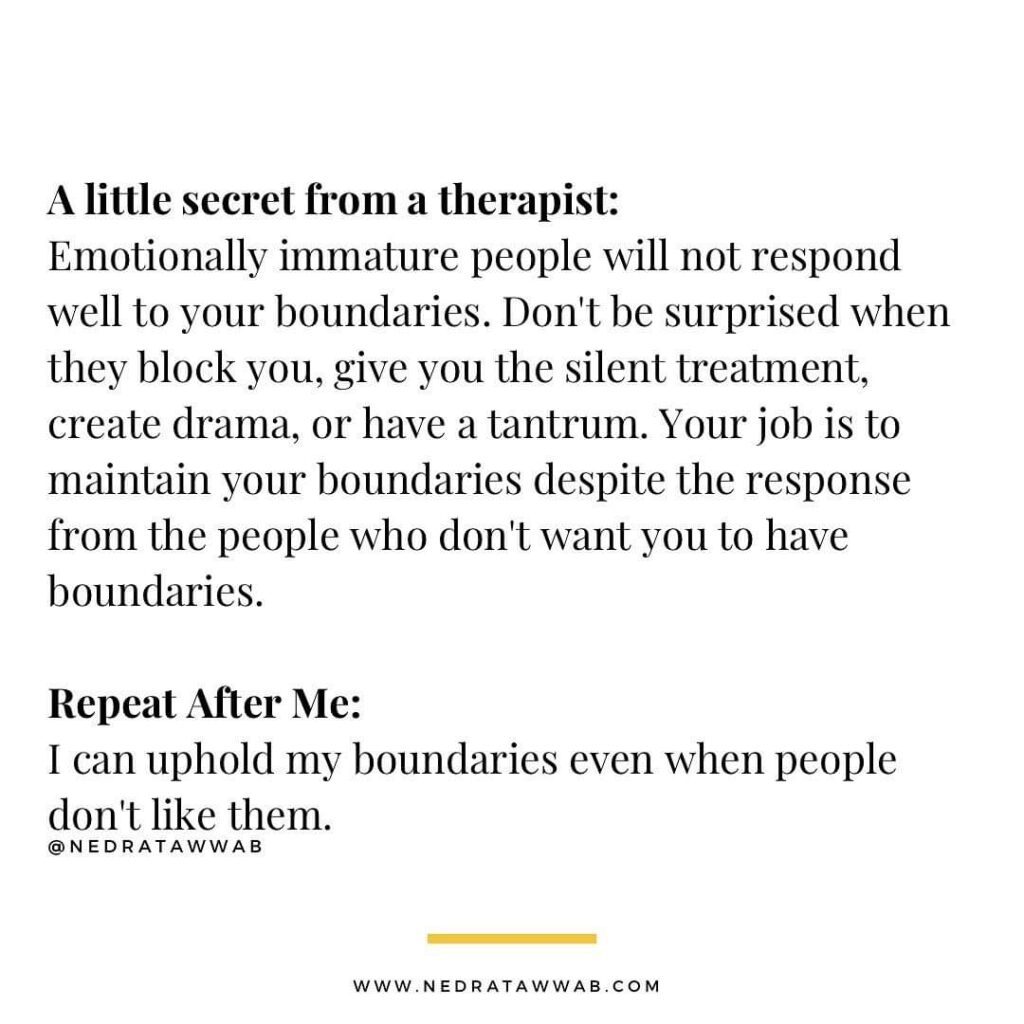How to Deal With Emotionally Immature Parents Through Mindfulness
Look, we’ve all got parents. Some are great, some… not so much. If you’re dealing with the not-so-great kind, aka emotionally immature parents, you’re in the right place.
Today I’ll offer you a few mindfulness strategies you can use to heal from an emotionally immature childhood and move on to your best life and healthiest relationships!

Signs of Emotionally Immature Parents
Common signs of emotionally immature parents include:
- They operate with a strict “right” and “wrong” mentality.
- They think in black and white. No gray areas!
- Reactive and defensive, they’re like a bomb waiting to go off. One wrong word and BOOM!
- They’re either helicopter parents (extremely controlling) or ghost parents (ver uninvolved). No in-between.
- Emotions? Empathy? Understanding? Sorry, fresh out of stock.
- They’re master manipulators. Guilt trips are their favorite vacation.
The Four Types of Emotionally Immature Parents

According to Dr. Lindsay Gibson, there are four types of emotionally immature parents:
1. Emotional Parents
Drama queens and kings. Buckle up for the roller coaster! (Unstable and unpredictable)
2. Driven Parents
Highly achievement-oriented, pushing their children to succeed at the expense of emotional connection.
3. Passive Parents
Cool when things are chill, MIA when stuff hits the fan.
4. Rejecting Parents
Dismissive and emotionally unavailable, Imagine if your parent was a brick wall.
How Mindfulness Helps With Frustrating Parents

Mindfulness isn’t just a buzzword. It’s a stress-buster, helps you stay calm when parents are being… parents, improves communication, even with difficult people, and teaches you to be kinder to yourself.
Reduce Stress
Mindfulness practices, like deep breathing and meditation, help reduce stress levels, making it easier to handle frustrating situations calmly.
Control Emotions
By focusing on the present moment, mindfulness allows you to observe your emotions without becoming overwhelmed by them. This detachment helps you to not taking parents’ immature behaviors personally.
i.e. It helps you not lose your *** when your parents are being… well, themselves.
Better Communication
Mindfulness encourages active listening and empathetic responses, which can improve communication with emotionally immature parents, reducing conflict.
It’s like relationship WD-40. Makes those awkward convos smoother.
Self-Compassion
Mindfulness encourages self-compassion, helping you to be kinder to yourself and to recognize that your parent’s behavior is not a reflection of your worth.
It teaches you to be your own cheerleader. Because sometimes, you gotta be your own parent.
A related article I’ve written that I recommend is How to Cope with Dismissive Parents
Mindfulness Practices

1. Emotional Regulation
Mindfulness practices, like as meditation and mindful breathing, help your regulate your emotions and reduce stress. It’s like emotional CrossFit. Tough, but worth it. This is important for those dealing with the emotional volatility often associated with having emotionally immature parents.
2. Self-Awareness
Mindfulness enhances self-awareness, allowing you to recognize and accept your feelings without judgment. This can lead to better emotional processing and resilience.
3. Present Focus
By focusing on the present moment, mindfulness helps you detach from past traumas and anxieties about the future. It keeps you in the now, not stuck in the “remember when Dad said…” loop.
Other Practices for Dealing With Emotionally Immature Parents
Setting Boundaries

Time to build some emotional fences
Setting clear boundaries helps protect you from ongoing emotional harm and manipulation by emotionally immature parents. It’s like a force field against parental drama.
Establishing and maintaining boundaries empowers you to take control of their interactions and relationships, fostering a sense of autonomy and self-respect. You’re the boss of you. Act like it.
Effective boundary-setting can reduce conflicts and create a more manageable relationship dynamic, even if the parents remain emotionally immature.
Less drama = less headache. Simple math.
Therapy
Sometimes, you need a pro. Therapy provides professional guidance and support:
Therapists can offer personalized strategies and coping mechanisms, such as Cognitive-Behavioral Therapy (CBT) for changing negative thought patterns or Dialectical Behavior Therapy (DBT) for managing intense emotions.
Therapy can address deep-seated traumas and facilitate long-term healing, providing a safe space for emotional exploration and growth. A common therapeutic approach is cognitive behavioral therapy, which can help change negative thought patterns and improve emotional responses. You can read more about this approach here: https://www.betterhelp.com/advice/therapy/cbt-therapy-a-breakdown/
Mindfulness vs. Boundary-Setting vs. Therapy
Let’s do a quick comparison.
Mindfulness is DIY emotional regulation. Cheap and effective.
Boundary-Setting is ike building a fortress. Takes work but worth it.
And therapy is the big guns. Costs more but gets to the root.
Can Emotionally Immature Parents Change?
Emotionally immature parents can change, but it requires significant self-awareness, a willingness to seek help, and dedication to personal growth. Change is often complicated and can take time.
With proper support, such as therapy or counseling, an emotionally immature parent can learn to develop healthier emotional and communication skills.
It’s possible, but don’t hold your breath.
How to Detach from Emotionally Immature Parents

Detaching from emotionally immature parents involves several steps:
1. Let Go of the Fantasy
Understand that your parents may never change and accept them as they are. Time to cut those emotional puppet strings:
2. Observe, Don’t Absorb
Learn to stay emotionally detached and observe their behaviors without getting emotionally involved. Observe, don’t absorb.
3. Create Personal Boundaries
Set and maintain healthy boundaries to protect your emotional well-being. Build that emotional fortress. Anyone who wants inside must be let in through the gate.
4. Focus on Self-Care
Do activities that promote your well-being and personal growth. You do you. Focus on your own awesome.
Dealing with emotionally immature parents isn’t easy, but it’s doable. With these tools, you’re better equipped to handle the challenge. It’s about progress, not perfection. You’ve got this.


